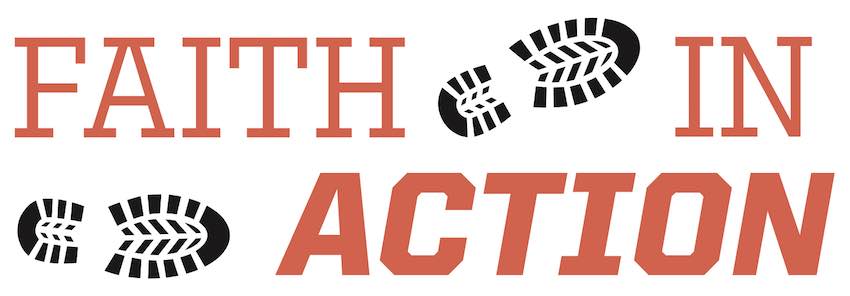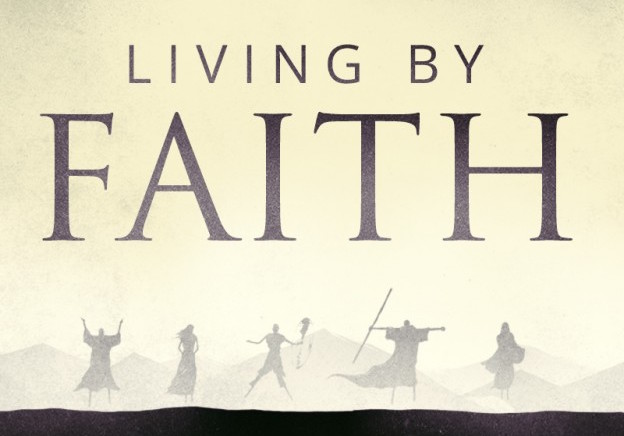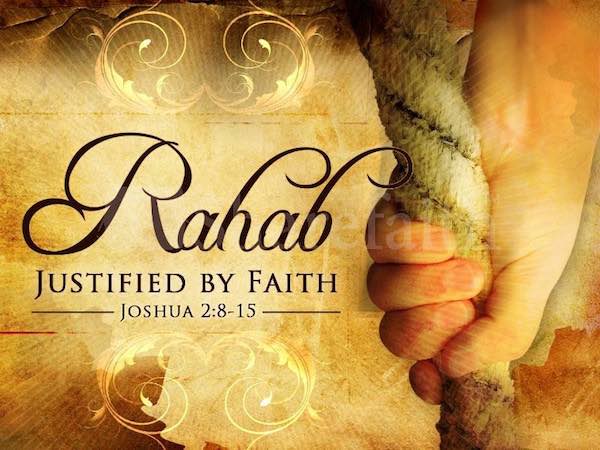What does faith in God look like?
I recently took a day-trip with a friend to go hiking in Israel. We journeyed from Jerusalem to Ein Gedi National Park by bus, about an hour’s journey, and spent 4-5 hours hiking around the beautiful trails of Ein Gedi, which is filled with waterfalls and pools of water that are perfect for relief from the intense sun of the Jordan Valley.
After a beautiful day of hiking and swimming we exited the park and walked toward the bus stop. At some point, as we were walking toward the bus stop, we prayed and asked God to provide a ride back to Jerusalem for us, whether it be by bus or some other means. Hitchhiking is quite common in Israel, so while we waited for the bus we decided to try to catch a ride.

At one point a private taxi pulled up and I told my friend that he would charge too much money and we shouldn’t even consider talking to him. A taxi ride from Ein Gedi to Jerusalem would probably be about 300 shekels (about $75). The taxi driver asked us where we were going and we told him Jerusalem. He offered to take us to Jerusalem for 60 shekels (about $15). This was just about the same price for the bus tickets for the two of us. So for 60 shekels we enjoyed a private taxi to Jerusalem. God had answered our prayer!
Walking by faith in God requires us to communicate with God, to listen to His voice, and to act when it is appropriate. I had nearly missed the provision of God in this private taxi ride to Jerusalem because I didn’t believe at first that the driver would give us a price below 300 shekels. I was expecting to hitch a ride with someone that was returning to Jerusalem and not to be offered an unheard of price in a private taxi. I was reminded that day that when I pray and ask God for something, I need to trust Him to provide and walk in faith when the opportunity arises. Faith requires action! This is one of the lessons that we learn in this week’s Torah Portion.
Watch this week’s commentary:
“שלך לך” – “Sh’lach lecha”
This week’s Torah Portion is called “שלך לך” – “Sh’lach lecha,” which is a command which means “Send” or “You send out.” We read this wording in the first two verses of this week’s study:
Then the LORD spoke to Moses saying, “Send out for yourself men so that they may spy out the land of Canaan, which I am going to give to the sons of Israel; you shall send a man from each of their fathers’ tribes, every one a leader among them.” – Num. 13:1-2
This was the beginning of the mission to spy out the Promised Land. I’m sure that this story is familiar to you as it is to me, however, the practical lessons to be learned are eternal.
The Choosing of the Twelve
Moses chose twelve men to spy out the Land and we have a record of each of those men in Numbers 13:1-15. Corresponding to each name of the twelve spies is the name of each of their fathers along with the tribe that each one was affiliated with. Then we read a bit of information that seems obscure:
These are the names of the men whom Moses sent to spy out the land; but Moses called Hoshea the son of Nun, Joshua. – Num. 13:16
Joshua the son of Nun was originally named Hoshea (Num. 13:8) but Moses called him Joshua. Joshua’s name appears as Joshua before this verse in the book of Numbers, however, Moses deemed it important to point out that at this time he chose to call him Joshua instead of Hoshea. Why did Moses change Hoshea’s name to Joshua?
The Meaning in a Name
The difference in the spelling of Hoshea and Joshua in the Hebrew language is just one letter, “הושע” – “Hoshea” and “יהושע” – “Yehoshua.” The difference in meaning of the two names is the following:
“הושע” – “Hoshea” = Salvation
“יהושע” – “Yehoshua” = The LORD is Salvation
We are not given a reason why Moses publicly declared that he preferred to call Hoshea by the name Yehoshua (Joshua), however, there are a couple of reasons that I’d like to suggest.

“Hoshea” to “Yehoshua”
The first possible reason that Moses changed Hoshea’s name to Yehoshua at that time is in connection to the change in Joshua’s status. Joshua was simply Moses’ helper prior to this mission of spying out the land, however, he was now recognized as a leader of the tribe of Ephraim and he was being sent out on a special mission. As an accompaniment to Hoshea’s new appointment it is possible that Moses was bestowing upon him a new name corresponding to his new position.
The second possible reason that Moses changed his name from Hoshea to Yehoshua is because of the meaning of the name Yehoshua. Hoshea just means “salvation.” When Moses added the Hebrew letter “yud” to Hoshea’s name, he was putting God’s Name into his name and reminding Joshua that “The LORD is Salvation” or “The LORD Saves.”
Yehoshua was about to enter into enemy land and he needed to cling to the salvation of the LORD and not depend on his own strength to save him. As we read in the book of Proverbs: “The horse is prepared for the day of battle, but salvation belongs to the LORD” (Prov. 21:31). The word for “salvation” – “תשועה” – “t’shuah” used here is the same Hebrew root word found in Joshua’s name. I believe that Moses was reiterating to Joshua that he must depend on the LORD for salvation from his enemies and not rely on his own strength. We see the reality of this after the spies returned from touring the Land.
The Report of the Ten
The twelve spies spent 40 days touring the Land and then they returned with some of the fruit of the Land along with their report. All twelve spies testified to the goodness and bounty of the Land, however, ten of the spies promoted fear and disbelief amongst the people:
But the men who had gone up with him said, “We are not able to go up against the people, for they are too strong for us.” So they gave out to the sons of Israel a bad report of the land which they had spied out, saying, “The land through which we have gone, in spying it out, is a land that devours its inhabitants; and all the people whom we saw in it are men of great size.” – Num. 13:31-32
The ten spies looked upon their enemies with natural eyes and not with faith. They were not relying on the salvation of the LORD but rather on their own strength and salvation.
In the report of the ten spies they stated that it is a land which “devours its inhabitants.” This phrase in Hebrew is “אוכלת יושביה” – “ochelet yoshvei’a,” which is literally translated as a land which “eats its inhabitants” or “consumes those who dwell in the land.” We see a direct response to this wording in the report of Joshua and Caleb.

The Report of the Two
Joshua and Caleb gave an exact opposite report from the ten spies who led the people into fear. Joshua and Caleb saw the exact same people and circumstances in the Land but they saw it from God’s perspective:
Joshua the son of Nun and Caleb the son of Jephunneh, of those who had spied out the land, tore their clothes; and they spoke to all the congregation of the sons of Israel, saying, “The land which we passed through to spy out is an exceedingly good land. If the LORD is pleased with us, then He will bring us into this land and give it to us—a land which flows with milk and honey. Only do not rebel against the LORD; and do not fear the people of the land, for they will be our prey. Their protection has been removed from them, and the LORD is with us; do not fear them.” – Num. 14:6-9
Instead of fearing the people and believing that the Israelites would be eaten up by those living in the Land, Joshua and Caleb proclaimed in these verses that “they will be our prey” (Num. 14:9), which in the Hebrew is “כי לחמנו הם” – “ki lachmenu hem,” and is literally translated as “for they are our bread” meaning “we will consume them.”
In the account of the bad report from the ten spies, the name of the LORD is not mentioned even once, they only focused on the giants in the Land. In contrast, Joshua and Caleb mentioned the name of the LORD three times in the four verses quoted above. Joshua and Caleb spoke in faith that the LORD would bring them into the Land for “the LORD is salvation” – “Yehoshua!”

The Will of the People
The nation of Israel decided to reject the report of Joshua and Caleb and follow the bad report of the ten instead. By choosing to follow the ten, the nation of Israel had not only rejected the report of Joshua and Caleb but they had also rejected the plan of the LORD. At one point the Israelites had even talked about electing a new leader to bring them back to Egypt (Num. 14:1-4). The people were rejecting God and rejecting all of His promises to them. They preferred to be slaves in Egypt rather than to serve the living God.
The Judgement of God
The LORD heard the murmuring and the complaining of the people as they were threatening to stone Joshua and Caleb (Num. 14:10). The LORD came down and appeared in the Tent of Meeting. The LORD then spoke to Moses and told him of His plan to wipe out the people of Israel and to make a new nation from the descendants of Moses (Num. 14:11-12). Moses pleaded with the LORD to forgive the people and the LORD forgave them but He also promised that all of those 20 years old and older would die in the desert (Num. 14:13-30). Only Joshua and Caleb would be spared as they believed in God.
A complete generation of people would die in the desert because they rejected the plan and will of God. The LORD promised judgement for the adults of the nation but fulfillment of His plans for their children, the next generation:
Your children, however, whom you said would become a prey—I will bring them in, and they will know the land which you have rejected. But as for you, your corpses will fall in this wilderness. Your sons shall be shepherds for forty years in the wilderness, and they will suffer for your unfaithfulness, until your corpses lie in the wilderness. According to the number of days which you spied out the land, forty days, for every day you shall bear your guilt a year, even forty years, and you will know My opposition. I, the LORD, have spoken, surely this I will do to all this evil congregation who are gathered together against Me. In this wilderness they shall be destroyed, and there they will die. – Num. 14:31-35
Such a tragic end to the whole adult generation who came out of Egypt. They saw God’s hand of power displayed in Egypt, in crossing the Red Sea, and throughout their travels in the desert, however, they rejected it all and God’s judgement awaited them.
The “Unfaithfulness” of the Nation
In the LORD’s pronouncement of judgement on the people of Israel He proclaimed that their children would be shepherds in the desert wilderness for 40 years and suffer for “your unfaithfulness,” meaning the unfaithfulness of their parents (Num. 14:33). The word for “your unfaithfulness” is the Hebrew word “זנותיכם” – “zenutechem” and is literally translated as “your prostitution” and comes from the Hebrew root word “זנה” – “zanah,” meaning “the act of fornication, adultery, prostitution, etc…” Translations often like to tone down the severity of the biblical language, however, God was literally judging the people for rejecting Him, playing the harlot, and choosing their own gods.
The Prostitution of the People
Unbelief in the promises of God is unbelief in God Himself. The LORD equated the unbelief and rebellion of the children of Israel to that of the unfaithful act of prostitution. God hates our unbelief and longs for a people that will trust Him and walk with Him in faith, especially when there are giants in the Land. God wants to show His power in our weakness but we must walk with Him in faith. He won’t force us to trust Him or believe in Him. We must choose to trust Him! We must choose to believe Him! We must choose to have faith!

Entering the Land
This week’s corresponding reading in the prophets is found in Joshua chapter 2, which is the continued story of the children of Israel. It was 40 years later and the children of Israel were preparing to enter the Land under Joshua’s leadership:
Then Joshua the son of Nun sent two men as spies secretly from Shittim, saying, “Go, view the land, especially Jericho.” So they went and came into the house of a harlot whose name was Rahab, and lodged there. – Joshua 2:1
Instead of sending twelve spies, Joshua chose to send two spies to go into the Land. Joshua wanted to send men of faith and did not want to encounter another rebellion amongst his people. Most of us are familiar with the story of the conquering of Jericho. If you are not familiar with this account of conquering Jericho, please read Joshua chapters 2-6.
Staying in the Home of a Prostitute
The spies entered the Land and went into the city of Jericho, which was the first city on the other side of the Jordan River. We then read, “they went and came into the house of a harlot whose name was Rahab.” The two spies that Joshua sent into Jericho went into the home of a harlot, a prostitute. Why would they enter a home of a prostitute?
The Bible does not give us details regarding why they entered a home of a prostitute, however, from a strategic position it was probably a smart move. These two spies were foreigners going into a city which they were hoping to infiltrate. To visit a prostitute would appear like normal activity for strange men in a city not their own. In other words, it provided a good coverup for the real reason that they came to the city.

Rahab the Prostitute
Beyond the human reasoning for understanding why the two spies went into the home of a prostitute, we read that God also had a plan in this as well. God had prepared the heart of this particular prostitute to receive the Israelites as a result of her faith in the LORD and for what He was about to do in the Land:
Now before they lay down, she came up to them on the roof, and said to the men, “I know that the LORD has given you the land, and that the terror of you has fallen on us, and that all the inhabitants of the land have melted away before you. For we have heard how the LORD dried up the water of the Red Sea before you when you came out of Egypt, and what you did to the two kings of the Amorites who were beyond the Jordan, to Sihon and Og, whom you utterly destroyed. When we heard it, our hearts melted and no courage remained in any man any longer because of you; for the LORD your God, He is God in heaven above and on earth beneath. – Joshua 2:8-11
Rahab declared to the spies that she was fully aware of who the LORD is, the God of heaven and earth, and of all the miracles which He has performed for the children of Israel bringing them out of Egypt, drying up the Red Sea before them, and how He had recently given two kings into their hands. Rahab knew who God was, believed that God had given that land to the Israelites, and was fully onboard with His plans.
The Faith of Rahab
In the few verses which I quoted above, Rahab proclaimed the name of the LORD three times as she declared her faith in the LORD God of Israel. Rahab, who was formerly a prostitute, was a woman of faith. The word used to describe rahab as a prostitute in Joshua 2:1 is the Hebrew word “זונה” – “zona” and is a common word used in the Bible for a prostitute. This is the same exact root word, “זנה” – “zanah,” which was used to describe the act of prostitution which the Israelites committed against the LORD by not believing Him and entering the Land 40 years earlier (Num. 14:33).

Faith Like a Prostitute
It is so characteristic of the LORD to use those who are rejected by this world yet have complete faith in Him to shame those who are righteous in their own sight and walk in unbelief. Rahab was a prostitute but she believed in the LORD and in His plans for the nation of Israel. As a result of her faith, Rahab and her family were saved from the sword that came upon the city of Jericho (Joshua 6:25).
It is recorded in the New Testament that Rahab became the mother of Boaz (Matt. 1:5), who was the great grandfather of King David, making Rahab the great, great grandmother of King David. Rahab is also registered in the letter to the Hebrews as a person of great faith:
By faith the walls of Jericho fell down after they had been encircled for seven days. By faith Rahab the harlot did not perish along with those who were disobedient, after she had welcomed the spies in peace. – Hebrews 11:30-31
Rahab’s faith in the God of heaven and earth brought her out of the life of prostitution and into the family and kingdom of God.
It is easy to read accounts in the Bible of people like Rahab, Joshua, Caleb, and others and to be encouraged in our faith. It is inspiring and faith-building to learn these stories afresh but we need to take it to the next level and live it out as well.
What is God saying to you and your community today?
What acts of faith is God calling you to walk in?
Real faith in God is not just a creed that we believe in. Living faith in the God of Abraham, Isaac, and Jacob is a life that is radically lived out in accordance with the fulfillment of the plans of God on this earth!
Shabbat Shalom!
If you enjoyed reading this article, share it today with friends! We also invite you to sign up for our weekly Torah Portion commentary on the sidebar to the right.
Help keep our weekly commentaries free and available to all. Click here to donate today:
Torah Portion: Num. 13:1 – Num. 15:41
Hafatara: Joshua 2:1 – 24
Return to Torah Portion Homepage
Copyright Jewels of Judaism. All rights reserved 2016



In a world today that could quickly be shaken and changed like Rehab’s was, it is so comforting to know God has a plan for a future and has given us a great hope both now and throughout eternity. He seeks us out to include us and believing in His ways will give sanctuary for us and our families. I love the way you bring the Hebrew words into teaching, it really brings what God is saying to “LIFE”. Amen to this work you do and blessings.
Thank you Aaron! Well stated and good application.
Shabbat Shalom!
Daniel
Thank you for this weeks torah portion. The timing of this word is perfect. Just yesterday I gave up on a particular situation and shared it with a friend who told me I was giving up on the plan of God himself. Today this word came in and I realized what was happening. I saw a mirror image of myself before God through this teaching and started to press on again.
Excellent. Thanks for sharing Cindy.
God bless you,
Daniel
This article inspires me what to teach in this coming Sunday in a seminar. 🙂 Thank you for publishing it earlier.
And it’s also inspiring to see the connection between ‘unfaithfulness’ and the faith of a prositude. And it’s so true that faith requires action and action describes our faith. May the Lord give us faith to act and walk with Him everyday.
Good to hear! Thank you Nancy.
I hope the teaching goes well on Sunday!
Daniel
Hi Daniel~ Wow, this is ‘spot on’. I hope I am not taking too much liberty in saying …each of us, as followers of Messiah Yeshua, must exercise our Faith(fulness). Our ‘Trust’ must be evident in our actions. My husband, Carl, and I are incredibly Grateful to you Daniel. We glean a good deal from your weekly commentary on the Torah portion. We look forward to reading and listening each week. I have felt impressed to ‘fast’ but have struggled to do so ,due to concerns involving intestinal issues. Your commentary helped me to realize I have been allowing ‘fear’ to choke out my ‘Faith’. Now~I pray I will CHOOSE to ‘TRUST’. Thank you for investing so much time into sharing insight and wisdom found in The Word of YHVH. May His rich Blessings overwhelm you with profound amazement. May you receive answers to your most heartfelt prayers Daniel ! {{Hugs}} from NC and always ~Shalom ! Bonnie and Carl
Dear Bonnie and Carl,
It is so nice to hear how you two are receiving my weekly commentaries. I’m glad that they have been a blessing to you.
I often write my weekly commentaries with great hesitation as I realize the truth of God’s Word for myself. We are all in process and being renewed day be day.
God bless you,
Daniel
VERY GOOD!
I needed this text as an ecouragement on my further way in Israel…..the living G`D will prepare my path and lead me; I just have to listen to HIS voice and be obedient!
Excellent! Thank you for the comments!
God bless you and lead you!
Daniel